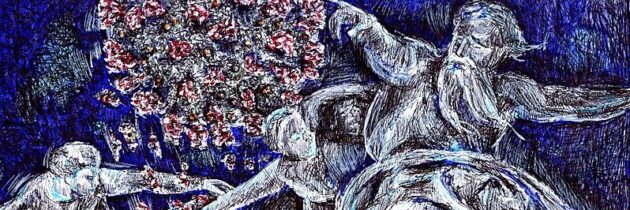Epiphany – The Glory of the Lord is Revealed
 The Solemnity of the Epiphany of the Lord was traditionally celebrated on January 6. However, since 1969, we have celebrated this feast on the Sunday following the celebration of Mary, Mother of God. This celebration is part of the Christmas season, which officially ends with the Baptism of the Lord on the Sunday after January 6.
The Solemnity of the Epiphany of the Lord was traditionally celebrated on January 6. However, since 1969, we have celebrated this feast on the Sunday following the celebration of Mary, Mother of God. This celebration is part of the Christmas season, which officially ends with the Baptism of the Lord on the Sunday after January 6.
The word Epiphany tells us what the celebration is all about. Epiphany means manifestation or appearance, particularly of a deity. It also refers to a sudden realization. The reading from St. Matthew’s Gospel (2:1-12) tells of the visit of wise men, astronomers and astrologers from the east, who saw a star rising in the heavens signaling the birth of a king in the land of Judah. These men traveled to the capital city and asked about the birth of the child who would be King of the Jews. Herod was not thrilled to hear of a potential rival. He found out where such a child might have been born and instructed the wise men to go to Bethlehem in search of the child, then return with the information to him. He planned to have the child killed, to eliminate his rival.
The wise men found Jesus and his family. They offered gifts of gold, frankincense, and myrrh, then returned to their own land by a different way, having been warned in a dream not to return to Herod. Joseph was also warned of Herod’s plan in a dream. He took the family and fled to Egypt until after Herod’s death, but that part of the story is not part of today’s reading.
These were the first non-Jews, the first Gentiles, who learned of the coming of Jesus. It was an Epiphany.
St. Paul speaks of this great news in his letter to the Ephesians (3:2-3a, 5-6). He proclaims that God has revealed to him an amazing mystery which had been unknown to those of earlier generations – The Gentiles are members of the same body and promise in Christ Jesus. The Good News proclaimed by Jesus was not just for Jews. It was for all people. Salvation has come for all. Another epiphany!
The light of Jerusalem has come and the glory of the Lord shines forth. Just as Isaiah (60:1-6) wrote to the exiles returning from Babylon, the Lord shines on his people. Sons and daughters return from afar. The riches of the sea are emptied out for all and the wealth of nations comes to Jerusalem, to God’s people. It is a time of great rejoicing. Out of a time of darkness, the Lord’s light has shone forth – an epiphany.
What does all of this mean for us? As we remember and rejoice in the coming of the wise men in search of the Lord, revealing the promise of salvation to all the world, may we too be open to the ways God’s presence is seen in cultures and peoples around the world, particularly those on the margins of society.
We hope and pray for the gift of openness to the rising of new generations of leaders as we get older. Can we rejoice in the wisdom and insights that come from our children and grandchildren as they experience life in a world very different from the one in which we grew to adulthood? Or will we be like Herod, clinging to power and fearful of the future?
Will we share the many blessings we have received with those who need a hand to meet the daily necessities of life? What gifts of gold, frankincense, and myrrh do we have to offer? The gold of respect and encouragement? The incense of loving support and prayerful accompaniment? The myrrh of compassion and understanding during difficult times?
The Lord has come. The wise ones traveled far in search for him and they found him. Now it’s our turn to look for him in the days and weeks to come. Where will we find him?
Read More





















 Why aren’t people coming to Church? People have always found God in nature, their everyday lives, and their prayer and celebrations at home. Many people now have different maps. They have different ways in which they arrange their lives. Where is worship in today’s society? How is it happening?
Why aren’t people coming to Church? People have always found God in nature, their everyday lives, and their prayer and celebrations at home. Many people now have different maps. They have different ways in which they arrange their lives. Where is worship in today’s society? How is it happening?









